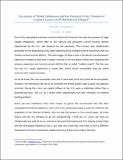| dc.contributor.author | Caballero, Ricardo J. | |
| dc.date.accessioned | 2011-06-24T22:40:47Z | |
| dc.date.available | 2011-06-24T22:40:47Z | |
| dc.date.issued | 2009-10 | |
| dc.identifier.uri | http://hdl.handle.net/1721.1/64675 | |
| dc.description.abstract | One of the main global economic concerns before the financial crisis was the presence of large
“global imbalances,” which refer to the massive and persistent current account deficits
experienced by the U.S. and financed by the periphery. This concern was intellectually
grounded on the devastating crises often experienced by emerging market economies that run
chronic current account deficits. The main trigger of these crises is the abrupt macroeconomic
adjustment needed to deal with a sudden reversal in the net capital inflows that supported the
previous expansion and current account deficits (the so called “sudden stops”). The fear was
that the U.S. would experience a similar fate, which would unavoidably drag the world
economy into a deep recession.
As we all know, the crisis eventually came and it came with more force than we all anticipated.
However, the mechanism did not at all resemble the feared sudden stop as quite the opposite
occurred. During the crisis, net capital inflows to the U.S. were a stabilizing rather than a
destabilizing force. The U.S. as a whole never experienced, not even remotely, an external
funding problem.
Some pre‐crisis imbalance critics have chosen to ignore the inconvenient fact that their
anticipated mechanism played no role in the crisis, choosing instead to take the credit for the
realization of the forecast of doom. One can feel the tension in the current paper: At times
Maury and Ken are tempted to go the self‐gratifying “I told you so” route, but they are
intellectually too solid to do so, and hence they pull themselves out of it. Deeply at heart they
still feel that global imbalances did it, but they also know that they need to find a different
mechanism from the conventional sudden stop story if they are to match the facts. | en_US |
| dc.language.iso | en_US | |
| dc.publisher | Federal Reserve Bank of San Francisco | en_US |
| dc.relation.isversionof | http://www.frbsf.org/economics/conferences/aepc/2009/Caballero.pdf | en_US |
| dc.rights | Creative Commons Attribution-Noncommercial-Share Alike 3.0 | en_US |
| dc.rights.uri | http://creativecommons.org/licenses/by-nc-sa/3.0/ | en_US |
| dc.source | Prof. Caballero via Kate McNeill | en_US |
| dc.title | Discussion of “Global Imbalances and the Financial Crisis: Products of Common Causes, by M. Obstfeld and K. Rogoff” | en_US |
| dc.title.alternative | Commentary: "Global Imbalances and the Financial Crisis: Products of Common Causes" | en_US |
| dc.type | Article | en_US |
| dc.identifier.citation | Caballero, Ricardo J. "Commentary: "Global Imbalances and the Financial Crisis: Products of Common Causes" Asia Economic Policy Conference (1st : 2009 : San Francisco, Calif.) | en_US |
| dc.contributor.department | Massachusetts Institute of Technology. Department of Economics | en_US |
| dc.contributor.approver | Caballero, Ricardo J. | |
| dc.contributor.mitauthor | Caballero, Ricardo J. | |
| dc.relation.journal | ASIA Economic Policy Conference, 2009 | en_US |
| dc.eprint.version | Author's final manuscript | en_US |
| dc.type.uri | http://purl.org/eprint/type/ConferencePaper | en_US |
| dspace.orderedauthors | Caballero, Ricardo J. | |
| dc.identifier.orcid | https://orcid.org/0000-0003-2760-451X | |
| mit.license | OPEN_ACCESS_POLICY | en_US |
| mit.metadata.status | Complete | |
